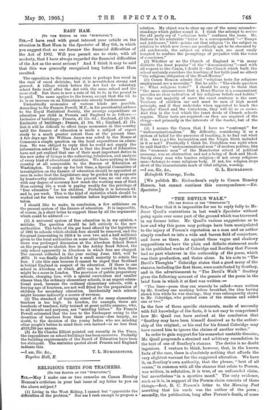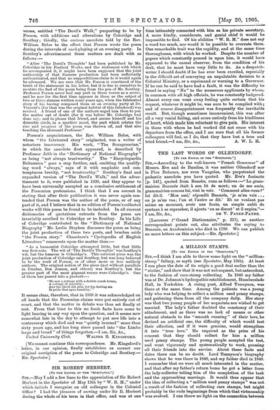"THE DEVIL'S WALK."
[To THE EDITOR OP THE "SPECTATOR."] fear that it is impossible for me to reply fully to Mr. Jesse Quail's contentions in last week's Spectator without going again over some part of the ground which was traversed in my former letter. Mr. Quail's various suggestions as to how and why this poem may perhaps have been manipulated to the injury of Porson's reputation as a man and an author simply conduct us into a wide and barren field of conjecture, and leave us there. As against these vague and shadowy suppositions we have the plain and definite statement made in the published works of Coleridge and Southey that Porson had no part whatever in the authorship of the poem, which was their production, and theirs alone. In his note to " The Devil's Thoughts " Coleridge states that a good many of the stanzas, including the first three, were contributed by Southey, and in the advertisement to " The Devil's Walk " Southey gives the following account of the genesis of the poem in the brief form in which it at first was written :- "The lines—poem they can scarcely be called—were written by Mr. Southey one morning before breakfast, the idea having struck him while he was shaving ; they were subsequently shown to Mr. Coleridge, who pointed some of the stanzas and added one or two."
In the face of these specific statements, made of necessity with full knowledge of the facts, it is not easy to comprehend how Mr. Quail can have arrived at the conclusion that "Southey may have been himself deceived as to the author- ship of the original; or his zeal for his friend Coleridge may have caused him to ignore the claims of another writer."
In order to gain support for his somewhat unstable theories, Mr. Quail propounds a strained and arbitrary emendation in the text of one of Southey's stanzas. The device is no doubt ingenious. I venture to think, however, that, in the known facts of the case, there is absolutely nothing that affords the very slightest warrant for the suggested alteration. We have
it, on Southey's own authority, that the phrase, " best of all verses," in common with all the stanzas that relate to Porson, was written, in refutation, it is true, of an unfounded claim, but nevertheless "in a sportive mood." The only evidence, such as it is, in support of the Porson claim consists of three things,—first, R. C. Porson's letter to the Morning Post asserting that his uncle was the author of the poem ; secondly, the publication, long after Porson's death, of some
verses, entitled "The Devil's Walk," purporting to be by Porson, with additions and alterations by Coleridge and Southey ; thirdly, the curious anecdote told by the Rev. William Beloe to the effect that Porson wrote the poem during the intervals of card-playing at an evening party. In Southey's advertisement these matters are dealt with as follows :—
" After The Devil's Thoughts' had been published by Mr. Coleridge in his Poetical Works, and the statement with which he accompanied it, it might have been supposed that the joint authorship of that Siamese production had been sufficiently authenticated, and that no supposititious claim to it would again be advanced. We are sure that Mr. Porson is convinced of the truth of the statement in his letter, but it is due to ourselves to re-state the fact of the poem being from the pen of Mr. Southey. Professor Porson never had any part in these verses as a writer, and he now for the first time appears in them as the subject of two or three stanzas written some years ago, when the fabricated story of his having composed them at an evening party at Dr. Vincent's (for that was the original habitat of this falsehood) was revived. A friend of one of the authors urged him then to put the matter out of doubt (for it was before Mr. Coleridge had done so) ; and to please that friend, and amuse himself and his domestic circle, in a sportive mood, the part which relates the rise and progress of the poem was thrown off, and that also touching the aforesaid Professor."
Porson's acquaintance, the Rev. William Beloe, with whom " the fabricated story " originated, was a writer of notorious inaccuracy. His work, " The. Sexagenarian," in which the anecdote first appeared, is described by Professor Jebb in the " Dictionary of National Biography " as being "not always trustworthy." The "Encyclopaedia Britannica " goes a step further, and, omitting the qualify- ing word "always," says of it with emphatic and con- temptuous brevity, " not trustworthy." Southey's final and expanded version of "The Devil's Walk," and the adver- tisement to it, were published in 1838, and they appear to have been universally accepted as a conclusive settlement of the Porsonian pretensions. I think that I am correct in stating that after their publication it was never again con- tended that Porson was the author of the poem, or of any part of it, and I believe that in no edition of Porson's collected works will this poem be found to be included. In all current dictionaries of quotations extracts from the poem are invariably ascribed to Coleridge or to Southey. In his Life of Coleridge contributed to the " Dictionary of National Biography " Mr. Leslie Stephen discusses the poem as being the joint production of these two poets, and brushes aside " the Porson story." Chambers's " Cyclopcedia of English Literature" comments upon the matter thus :- " As a humourist Coleridge attempted little, but that little was first-rate. The wit of The Devil's Thoughts' was Southey's wit, but the humour is Coleridge's. This satirical piece was the joint production of Coleridge and Southey, but was long believed to be the work of Porson, or of other more or less unlikely authors. The original notion of the piece (not without parallels in Dunbar, Ben Jonson, and others) was Southey's, but the greater part of the most piquant verses were Coleridge's. One of them has passed into a proverb:-
' He saw a cottage with a double coach-house, A cottage of gentility ; And the Devil did grin, for his darling sin Is pride that apes humility.' "
It seems clear, therefore, that in 1838 it was acknowledged on all hands that the Porsonian claims were put entirely out of court, and that the matter in debate was thus set finally at rest. From that time to this no fresh facts have come to light bearing in any way upon the question, and it seems now somewhat late in the day to attempt to put new life into a controversy which died and was "quietly inurned" more than sixty years ago, and has long since passed into " the Limbo large and broad " of things forgotten.—I am, Sir, &c., [We cannot continue this correspondence. Mr. Kingsford's letter, in our opinion, finally establishes as correct our original ascription of the poem to Coleridge and Southey.— ED. Spectator.]







































 Previous page
Previous page